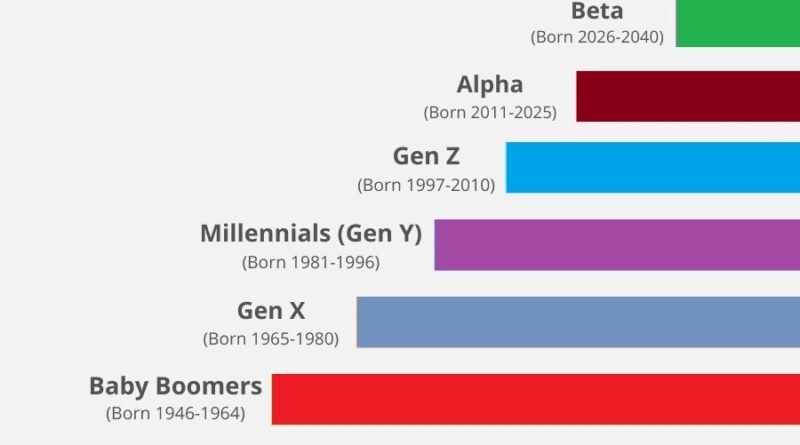Understanding Generations: A Look at Cultural, Social, and Historical Influences
Introduction
The concept of “generation” goes beyond mere chronological grouping; it encompasses the shared experiences, values, challenges, and milestones that define a group of people born within a specific time frame. Generations serve as cultural markers, helping us understand societal progress, challenges, and shifts in values over time. From the Silent Generation to Generation Alpha, each cohort has left an indelible mark on history while shaping the present and future.
What Defines a Generation?
A generation typically spans 15-20 years, but its defining characteristics often emerge from shared experiences rather than strict timelines. Factors such as major historical events, technological advancements, economic conditions, and cultural movements significantly influence generational identity.
Sociologists and historians often categorize generations to analyze societal trends, including shifts in work ethics, political views, family structures, and lifestyle choices. However, generational boundaries are fluid, and individuals within a cohort may have diverse experiences based on geography, socio-economic background, and personal circumstances.
Major Generations in Modern History
1. The Silent Generation (1928–1945)
Known for their stoicism and work ethic, this generation lived through the Great Depression and World War II. They grew up in a time of economic hardship, which instilled values of frugality, loyalty, and sacrifice. Often overshadowed by the more prominent Baby Boomers, the Silent Generation played a pivotal role in building post-war economies and institutions.
2. Baby Boomers (1946–1964)
Born during the post-World War II baby boom, this generation witnessed unprecedented economic growth and social change. Known for their optimism and ambition, Boomers were at the forefront of cultural revolutions such as the Civil Rights Movement, the counterculture of the 1960s, and the women’s liberation movement. They also contributed to consumer-driven economies and significantly shaped global politics and business.
3. Generation X (1965–1980)
Often referred to as the “latchkey generation,” Gen X grew up during a period of increasing divorce rates and dual-income households. They experienced the rise of technology, such as personal computers and video games, and witnessed the end of the Cold War. Known for their independence and skepticism, Generation X bridged the gap between the analog and digital worlds.
4. Millennials (1981–1996)
Also known as Generation Y, Millennials came of age during the internet revolution and the early 21st century. They are characterized by their tech-savviness, openness to diversity, and entrepreneurial spirit. However, they also faced challenges such as student debt, the Great Recession, and a rapidly changing job market. Millennials prioritize experiences over material possessions and are driving changes in workplace culture and consumer behavior.
5. Generation Z (1997–2012)
As the first generation to grow up with smartphones and social media, Gen Z is often referred to as “digital natives.” They are highly tech-savvy, socially conscious, and pragmatic. This generation has been shaped by issues like climate change, social justice movements, and the COVID-19 pandemic. Gen Z values authenticity and inclusivity, pushing for systemic changes in various sectors.
6. Generation Alpha (2013–2025)
The youngest generation, Generation Alpha, is growing up in an era dominated by artificial intelligence, automation, and climate concerns. They are likely to be the most educated and technologically adept generation yet. As they mature, their worldview will be influenced by the digital environment and the global challenges they inherit.
Key Drivers of Generational Differences
- Technological Advancements
Each generation interacts with technology differently. While Baby Boomers adapted to computers and the internet later in life, Millennials and Gen Z grew up with these innovations. The emergence of AI, virtual reality, and automation will undoubtedly shape Generation Alpha’s experiences. - Economic Shifts
From the post-war economic boom to the global financial crises, economic conditions have played a crucial role in shaping generational attitudes toward work, savings, and consumption. - Cultural Movements
Movements such as civil rights, feminism, LGBTQ+ rights, and environmentalism have defined generational values and priorities, influencing societal norms and policies. - Global Events
Wars, pandemics, and international collaborations (e.g., space exploration) have left lasting impressions on different generations, fostering resilience, innovation, or shifts in worldviews.
Challenges in Understanding Generations
While generational analysis provides valuable insights, it is not without limitations. Overgeneralization can lead to stereotypes, ignoring the diversity within a generation. Moreover, cross-cultural variations mean that generational characteristics in one region may not apply globally.
The Future of Generations
As we progress into the 21st century, the concept of generations will continue to evolve. With rapid technological advancements and interconnected global societies, future generations may experience even shorter generational cycles due to the accelerated pace of change. Understanding these dynamics will be crucial for businesses, governments, and individuals to adapt and thrive.
Conclusion
Generations are more than mere labels; they are windows into the collective psyche of societies at different points in history. By studying generational traits, we gain a deeper understanding of the past and a clearer vision for the future. While each generation faces unique challenges, their contributions build upon those of their predecessors, shaping a legacy for those yet to come.

